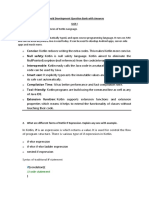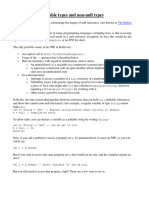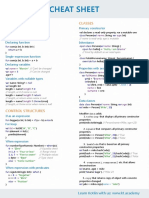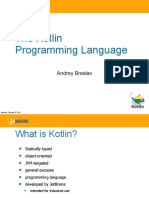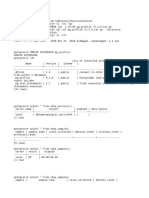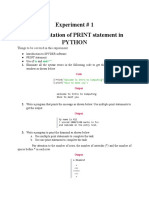Kotlin
Introduction
to Kotlin
@kotlin | Developed by JetBrains
Why Kotlin?
● Expressiveness/Conciseness
● Safety
● Portability/Compatibility
● Convenience
● High Quality IDE Support
● Community
● Android 👀
● More than a gazillion devices run Java Kotlin
● Lactose free
● Sugar free
● Gluten free
Logo
Name
Kotlin is named after an island in the Gulf of Finland.
Hello, world!
fun main(args: Array<String>) {
println("Hello, world!")
}
fun main() {
println("Hello, world!")
}
fun main() = println("Hello, world!")
Where is “;”???
The basics
fun main(args: Array<String>) {
print("Hello")
println(", world!")
}
● An entry point of a Kotlin application is the main top-level function.
● It accepts a variable number of String arguments that can be omitted.
● print prints its argument to the standard output.
● println prints its arguments and adds a line break.
Variables
val/var myValue: Type = someValue
● var - mutable
● val - immutable
● Type can be inferred in most cases
● Assignment can be deferred
val a: Int = 1// immediate assignment
var b = 2 // 'Int' type is inferred
b=a // Reassigning to 'var' is okay
val c: Int // Type required when no initializer is provided
c=3 // Deferred assignment
a=4 // Error: Val cannot be reassigned
Variables
const val/val myValue: Type = someValue
● const val - compile-time const value
● val - immutable value
● for const val use uppercase for naming
const val NAME = "Kotlin" // can be calculated at compile-time
val nameLowered = NAME.lowercase() // cannot be calculated at compile-time
Functions
fun sum(a: Int, b: Int): Int { Single expression function.
return a + b Unit means that the function does not
} return anything meaningful.
It can be omitted.
fun mul(a: Int, b: Int) = a * b
Arguments can have default values.
fun printMul(a: Int, b: Int): Unit {
println(mul(a, b))
}
fun printMul1(a: Int = 1, b: Int) {
println(mul(a, b))
}
fun printMul2(a: Int, b: Int = 1) = println(mul(a, b))
If expression
fun maxOf(a: Int, b: Int): Int { fun maxOf(a: Int, b: Int) =
is the same as
if (a > b) { if (a > b) {
return a a
} else { } else {
return b b
} }
}
if can be an expression (it can return).
Can be a one-liner:
fun maxOf(a: Int, b: Int) = if (a > b) a else b
When expression
when (x) { when {
1 -> print("x == 1") x < 0 -> print("x < 0")
2 -> print("x == 2") x > 0 -> print("x > 0")
else -> { else -> {
print("x is neither 1 nor 2") print("x == 0")
} }
} }
when returns, the same way that if does.
The condition can be inside of the
branches.
When statement
fun serveTeaTo(customer: Customer) {
val teaSack = takeRandomTeaSack()
when (teaSack) {
is OolongSack -> error("We don't serve Chinese tea like $teaSack!")
in trialTeaSacks, teaSackBoughtLastNight ->
error("Are you insane?! We cannot serve uncertified tea!")
}
teaPackage.brew().serveTo(customer)
}
when can accept several options in one branch. else branch can be omitted if when block is
used as a statement.
&& vs and
if (a && b) { ... } VS if (a and b) { ... }
Unlike the && operator, this function does not perform short-circuit evaluation.
The same behavior with OR:
if (a || b) { ... } VS if (a or b) { ... }
Loops
val items = listOf("apple", "banana", "kiwifruit")
for (item in items) {
println(item)
}
for (index in items.indices) {
println("item at $index is ${items[index]}")
}
for ((index, item) in items.withIndex()) {
println("item at $index is $item")
}
Loops
val items = listOf("apple", "banana", "kiwifruit")
var index = 0
while (index < items.size) {
println("item at $index is ${items[index]}")
index++
}
var toComplete: Boolean
do {
...
toComplete = ...
} while(toComplete)
The condition variable can be initialized inside to the do…while loop.
Loops
There are break and continue labels for loops:
myLabel@ for (item in items) {
for (anotherItem in otherItems) {
if (...) break@myLabel
else continue@myLabel
}
}
Ranges
val x = 10
if (x in 1..10) {
println("fits in range")
}
for (x in 1..5) {
print(x)
}
for (x in 9 downTo 0 step 3) {
print(x)
}
downTo and step are extension functions, not keywords.
'..' is actually T.rangeTo(that: T)
Null safety
val notNullText: String = "Definitely not null"
val nullableText1: String? = "Might be null"
val nullableText2: String? = null
fun funny(text: String?) {
if (text != null)
println(text)
else
println("Nothing to print :(")
}
fun funnier(text: String?) {
val toPrint = text ?: "Nothing to print :("
println(toPrint)
}
Elvis operator ?:
If the expression to the left of ?: is not null, the Elvis operator
returns it; otherwise, it returns the expression to the right.
Note that the expression on the right-hand side is evaluated
only if the left-hand side is null.
fun loadInfoById(id: String): String? {
val item = findItem(id) ?: return null
return item.loadInfo() ?: throw Exception("...")
}
Safe Calls
someThing?.otherThing does not throw an NPE if someThing is null.
Safe calls are useful in chains. For example, an employee may be assigned to a department
(or not). That department may in turn have another employee as a department head, who
may or may not have a name, which we want to print:
fun printDepartmentHead(employee: Employee) {
println(employee.department?.head?.name)
}
To print only for non-null values, you can use the safe call operator together with let:
employee.department?.head?.name?.let { println(it) }
Unsafe Calls
The not-null assertion operator (!!) converts any value to a non-null type and throws an NPE
exception if the value is null.
fun printDepartmentHead(employee: Employee) {
println(employee.department!!.head!!.name!!)
}
Please, avoid using unsafe
calls!
TODO
Always throws a NotImplementedError at run-time if called, stating that operation is not
implemented.
// Throws an error at run-time if calls this function, but compiles
fun findItemOrNull(id: String): Item? = TODO("Find item $id")
// Does not compile at all
fun findItemOrNull(id: String): Item? = { }
String templates and the string builder
val i = 10
val s = "Kotlin"
println("i = $i")
println("Length of $s is ${s.length}")
val sb = StringBuilder()
sb.append("Hello")
sb.append(", world!")
println(sb.toString())
Lambda expressions
val sum: (Int, Int) -> Int = { x: Int, y: Int -> x + y }
val mul = { x: Int, y: Int -> x * y }
According to Kotlin convention, if the last parameter of a function is a function, then a lambda
expression passed as the corresponding argument can be placed outside the parentheses:
val badProduct = items.fold(1, { acc, e -> acc * e })
val goodProduct = items.fold(1) { acc, e -> acc * e }
If the lambda is the only argument, the parentheses can be omitted entirely (the
documentation calls this feature "trailing lambda as a parameter"):
run({ println("Not Cool") })
run { println("Very Cool") }
When in doubt
Go to:
● kotlinlang.org
● kotlinlang.org/docs
● play.kotlinlang.org/byExample
Thanks!
@kotlin | Developed by JetBrains






